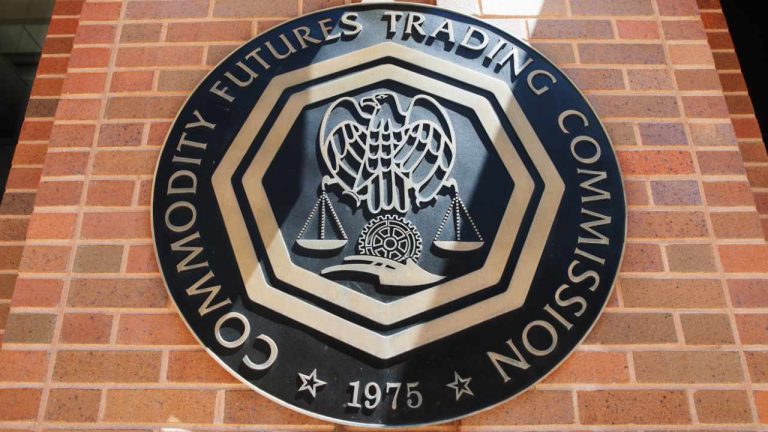
Rostin Behnam, chairman of the Commodity Futures Trading Commission (CFTC), says he is seeking authority from US Congress to regulate Bitcoin (BTC), Ethereum (ETH) and other digital tokens as commodities. In a new CNBC interview, Behnam reiterates a position held by other US regulatory agencies that Bitcoin is a commodity, but he takes a contested […]
The post CFTC Chair Calls Bitcoin and Ethereum ‘Digital Commodity Tokens’, Says Regulator Seeking More Power From Congress appeared first on The Daily Hodl.

The committee meeting was Johnson’s first as committee sponsor; she chose to concentrate on digital assets and the Digital Commodities Consumer Protection Act in her opening.
The United States Commodity Futures Trading Commission (CFTC) Market Risk Advisory Committee (MRAC) held its first meeting with its new membership Sept. 28. In her opening statement, the committee’s sponsor, Commissioner Kristin N. Johnson, ran through a laundry list of issues for consideration, but spent the bulk of her time talking about digital assets.
This is the first MRAC meeting under Johnson’s leadership. She gave a summary of CFTC actions in the crypto space, including the controversial Ooki DAO case, the recent White House Comprehensive Framework for Responsible Development of Digital Assets and the CFTC roundtable on non-intermediationheld earlier this year.
Investigation, enforcement and new guidance can give clarity and certainty to market participants, Johnson said. Cryptocurrency industry and traditional market participants “desire a clear indication of the Commission’s next steps,” she added.
I’m honored to join my first meeting as an official member of @CFTC’s Market Risk Advisory Committee tomorrow at 9:30am. Thank you @CFTCjohnson for including me in the discussion. https://t.co/JdR2Ni7Woe
— Kristin Smith (@KMSmithDC) September 28, 2022
Johnson then turned her attention to the Digital Commodities Consumer Protection Act of 2022 (DCCPA), introduced by Senate Agriculture Committee members Debbie Stabenow and John Boozman. The Senate Agriculture Committee has oversight over the CFTC. The bill, she noted, expands the definition of commodity in the Commodities Exchange Act to include digital commodities and requires digital commodity platforms to register with the CFTC.
In addition, the DCCPA would require market participants to join the derivatives markets self-regulatory organization the National Futures Association, which would give customers recourse to the CFTC’s Reparations Program, which is:
“A cost-effective way for customers to address their grievances with a registrant without having to hire a lawyer and engage in costly litigation or arbitration.”
In addition, the DCCPA “may be transformative” in the way it fosters inclusion of underbanked and underrepresented communities in the traditional finance markets, Johnson said.
Related: CFTC labels 34 crypto and forex firms as unregistered foreign entities
The DCCPA is one of several bills in Congress that would regulate digital assets. Others include the Lummis-Gillibrand Responsible Financial Innovation Act and the Digital Commodity Exchange Act of 2022 in the House of Representatives.

The CFTC’s actions have even been met with strong pushback from its own commissioner, while others have drawn comparisons to the SEC’s regulation by enforcement tactics.
The Commodities Futures Trading Commission (CFTC) has sparked strong criticism from the community after filing a federal civil enforcement action against members of decentralized autonomous organization Ooki DAO over digital asset trading violations.
In a Sept. 22 release, the CFTC stated that it had filed and simultaneously settled charges against the founders of decentralized trading platform bZeroX Tom Bean and Kyle Kistner for their role in “illegally offering leveraged and margined retail commodity transactions in digital assets”
However, the community has kicked up a fuss over a simultaneous civil enforcement action against bZeroX’s associated Ooki DAO and its members, which it alleges it operated the same software protocol as bZeroX after it was passed control of it, and thus “violating the same laws as the respondents.”
The enforcement action has drawn the ire of a number of crypto lawyers and even a CFTC commissioner with concerns it will set an unfair regulatory precedent.
In a dissenting statement on Sept. 22, CFTC commissioner Summer Mersinger noted that while she supports the CFTC’s charges against the bZeroX founders, the enforcement body is stepping into uncharted legal territory when taking action against DAO members that voted on governance proposals.
“I cannot agree with the Commission’s approach of determining liability for DAO token holders based on their participation in governance voting for a number of reasons.”
“This approach constitutes blatant ‘regulation by enforcement' by setting policy based on new definitions and standards never before articulated by the Commission or its staff, nor put out for public comment,” she said.
Jake Chervinsky, lawyer and head of policy at the U.S. Blockchain Association on Twitter said the enforcement action "may be the most egregious example" of regulation by enforcement in the history of crypto, and drew comparisons between the U.S. Securities and Exchange Commission and the CTFC, noting that:
“We've complained at length about the SEC abusing this tactic, but the CFTC has put them to shame.”
It's deeply disappointing to see the CFTC damage its own reputation like this among those who care about the future of crypto in the United States, especially at a critical moment while it pitches itself in Congress as the right agency to regulate "digital commodity trades."
— Jake Chervinsky (@jchervinsky) September 22, 2022
The DeFi Education Fund also chimed in by noting that the CFTC’s charges also offer a gloomy prospect for people trying to innovate via DAOs.
Related: CFTC commissioner visits Ripple offices as decision in SEC case looms
“'Lawmaking via enforcement’ stifles innovation in the US, and today’s action will sadly further discourage any US person from not only developing but also *merely participating* in DAOs,” it wrote.
Big picture themes to take away: 1. How much control does a Dao have? if it's too much, maybe it's the counterparty to the transactions offered by the protocol; maybe decentralization of control over the protocol, not over voting to control of the protocol is what matters. /11
— Drew Hinkes (@propelforward) September 22, 2022
The list of charges include illegally offering retail leverage and margin trading; “engaging in activities only registered futures commission merchants (FCM) can perform;” and failing to incorporate a customer identification program under the Bank Secrecy Act.
The CTFC also outlined that Bean and Kistner indicated that they wanted to transfer bZeroX over the Ooki DAO as part of a move to avoid crackdowns under the gray area of decentralization.
“By transferring control to a DAO, bZeroX’s founders touted to bZeroX community members the operations would be enforcement-proof — allowing the Ooki DAO to violate the CEA and CFTC regulations with impunity,” the CFTC stated.

The outcome of the SEC v. Ripple lawsuit could influence whether the CFTC or SEC will play a greater role in handling the XRP token as a commodity or security.
Caroline Pham, one of five commissioners at the United States Commodity Futures Trading Commission, or CFTC, met with Ripple CEO Brad Garlinghouse ahead of a court decision which could affect how regulators handle XRP tokens.
In a Monday tweet, Pham said she visited Ripple Labs’ offices as part of a “learning tour” involving crypto and blockchain. Garlinghouse later tweeted that the commissioner’s visit was related to “public-private engagement” — likely referring to a privately funded company like Ripple engaging with U.S. regulators.
The next stop on my learning tour was visiting @Ripple Labs. Thanks @bgarlinghouse! #XRP #crypto #blockchain pic.twitter.com/ICr8H2ZE3q
— Caroline D. Pham (@CarolineDPham) September 19, 2022
The timing of Pham’s visit had many on social media reacting to the CFTC’s approach in engaging with crypto firms and token projects when compared to that of the Securities and Exchange Commission, or SEC. On Saturday, the SEC and Ripple both filed motions for summary judgment in a case alleging the firm’s XRP sales violated securities laws. The case has been ongoing since December 2020.
The outcome of the SEC case could influence which federal regulator might play a greater role in handling the XRP token as a commodity or security. Garlinghouse claimed on Saturday that the SEC wasn’t “interested in applying the law” and alleged the regulator sought to “expand their jurisdiction far beyond the authority granted to them by Congress.”
Related: The SEC vs. Ripple lawsuit: Everything you need to know
Under chair Gary Gensler, the SEC has pursued many enforcement actions against crypto projects and related areas. The regulatory body labeled nine tokens as “crypto asset securities” falling under its purview in July complaint against a former Coinbase product manager, prompting criticism from Pham at the time.
Cointelegraph reached out to the CFTC, but did not receive a response at the time of publication.
 The Commodity Futures Trading Commission (CFTC) has shared with Congress its plans to regulate the crypto market with “full oversight capabilities” if the proposed Digital Commodities Consumer Protection Act becomes law. The regulator claims to have the right experience and expertise and believes that “Many digital assets constitute commodities.” Meanwhile, SEC Chairman Gary Gensler has […]
The Commodity Futures Trading Commission (CFTC) has shared with Congress its plans to regulate the crypto market with “full oversight capabilities” if the proposed Digital Commodities Consumer Protection Act becomes law. The regulator claims to have the right experience and expertise and believes that “Many digital assets constitute commodities.” Meanwhile, SEC Chairman Gary Gensler has […]
The head of the U.S. Commodity Futures Trading Commission (CFTC) is calling for regulating many digital assets as commodities. CFTC chair Rostin Behnam is supporting the proposed U.S. Senate bill 4760, the Digital Commodities Consumer Protection Act of 2022 (DCCPA), to give his agency oversight authority to regulate cryptocurrency assets the same way they do […]
The post U.S. CFTC Chair Says ‘Many’ Crypto Assets Are Commodities, Calls for His Agency To Regulate Digital Asset Space appeared first on The Daily Hodl.

The fact sheet sums up the efforts of nine federal agencies’ research over the past six months.
Following United States President Joe Biden’s executive order on Ensuring Responsible Development of Digital Assets, federal agencies came up with a joint fact sheet on six principal directions for the crypto regulation in the U.S. It sums up the content of nine separate reports, which have been submitted to the President to “articulate a clear framework for responsible digital asset development and pave the way for further action at home and abroad.”
The fact sheet was published on the White House official website on Sept. 16, and consists of seven sections: (1) Protecting Consumers, Investors, and Businesses; (2) Promoting Access to Safe, Affordable Financial Services; (3) Fostering Financial Stability; (4) Advancing Responsible Innovation; (5) Reinforcing Our Global Financial Leadership and Competitiveness; (6) Fighting Illicit Finance; (7) Exploring a U.S. Central Bank Digital Currency (CBDC).
Some of the sections don’t contain any particularly new information, emphasizing one more time the principles and policies which the President's Administration has been sticking to. For example, to protect consumers and investors, the reports urge regulators — the Securities and Exchange Commission and Commodity Futures Trading Commission — to “aggressively pursue investigations and enforcement actions against unlawful practices in the digital assets space.” At the same time, they don’t say anything particular about the regulators’ segregation of duty, which still remains one of the main regulatory problems in the country.
In order to promote access to financial services, federal agencies recommend creating a federal framework for nonbank payment providers and encouraging the adoption of instant payment systems like FedNow, whose launch is planned by the Federal Reserve in 2023.
As a part of advancing responsible innovation efforts, the Office of Science and Technology Policy (OSTP), which has recently published a critical report on the climate impacts of crypto mining, will develop a Digital Assets Research and Development Agenda to help mitigate the negative climate impacts. With the same goal the Department of Energy, the Environmental Protection Agency, and other agencies will consider further tracking digital assets’ environmental impacts.
Related: Chamber of Digital Commerce says 'the time has come for the SEC to approve a Bitcoin ETF
While the fact sheet claims that the U.S. agencies will “leverage U.S. positions in international organizations to message U.S. values” related to digital assets, it doesn’t specify how exactly these values differ from the swiftly emerging European regulatory approach.
The security strategy implicates the amendments to the Bank Secrecy Act, anti-tip-off statutes, and laws against unlicensed money transmitting to apply explicitly to digital asset service providers, including exchanges and nonfungible token platforms.
The last, but perhaps the most important section of the fact sheet is dedicated to the U.S. CBDC. It reveals that the administration has already developed Policy Objectives for a U.S. CBDC system, but further research on the possible technological foundation of that system is needed. Still, the intent seems pretty serious as the Treasury will lead an interagency working group with the participation of the Federal Reserve, the National Economic Council, the National Security Council and the OSTP.